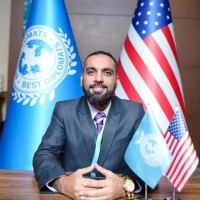What Are Ways to Ensure International Contracts Protect the Company's Interests?
International contracts can make or break a company's global aspirations. Hear from leading CEOs and Founders as they share how they safeguard their businesses. From incorporating comprehensive dispute-resolution clauses to engaging expert international lawyers, discover actionable insights from eleven industry experts. This curated wisdom will arm your company with the knowledge to thrive in the complex world of international agreements.
- Incorporate Comprehensive Dispute-Resolution Clauses
- Enlist Seasoned Trade Lawyers
- Ensure Clarity in Contract Details
- Use Strategic Choice of Law Provisions
- Leverage Custom Insurance Policies
- Build Data-Driven Partnerships
- Define Clear Termination Clauses
- Include Specific Intellectual Property Terms
- Detail Clauses on Key Contract Elements
- Use Clear Arbitration Clauses
- Engage Expert International Lawyers
Incorporate Comprehensive Dispute-Resolution Clauses
One effective way I've ensured that our international contracts protect Software House's interests is by incorporating comprehensive dispute-resolution clauses tailored to the specific legal and cultural contexts of the countries we work with. Given the complexities of international business, it's crucial to define clear processes for handling disputes that may arise due to differing laws or interpretations of contract terms.
In practice, this involved collaborating with legal experts who specialize in international law to draft clauses that outline the preferred method of dispute resolution—whether it be arbitration, mediation, or litigation—and specify the governing law applicable to the contract. For instance, we often opt for arbitration under the rules of a recognized institution, as it can offer neutral ground and be more efficient than litigation in foreign courts. Additionally, we specify the location for arbitration, choosing a jurisdiction that is favorable and accessible for both parties.
By proactively addressing potential disputes in the contract, we not only safeguard our interests but also foster a sense of fairness and clarity for our international partners. This approach has proven beneficial in maintaining strong business relationships while minimizing risks associated with cross-border transactions. Ultimately, thorough preparation and clear communication in our contracts empower us to navigate the complexities of international business with confidence.
Enlist Seasoned Trade Lawyers
One way I've ensured that my international contracts protect my company's interests is by enlisting the expertise of seasoned trade lawyers to meticulously review every clause. Their insights are invaluable in spotting potential issues that may not be immediately apparent to someone less familiar with international trade law. I also make it a priority to include clear terms regarding intellectual property rights and confidentiality, essential in protecting our proprietary designs and business processes. In one of my experiences,
I negotiated a secure clause for a performance guarantee, which has helped secure substantial contractual obligations even in challenging markets. Trustworthiness is built by developing contracts that are transparent and all-encompassing, allowing us to maintain strong, long-term relationships with our partners. Balancing legal thoroughness with the flexibility to adapt to different cultural norms is crucial, and I've seen firsthand how this approach fortifies our business operations.

Ensure Clarity in Contract Details
Dealing with international contracts has taught me that it's essential to keep an eye on details. Once, while negotiating a deal with a partner in Asia, we faced a language barrier that led to ambiguous clauses. To avoid future risks, I brought in a legal expert familiar with both local and international laws. We refined the contract, ensuring clarity on jurisdiction, dispute-resolution, and intellectual property.
I also insisted on mediation clauses to keep disputes out of expensive courts. It wasn't just about compliance but making sure the contract was watertight. This process took time, but it saved us from potential headaches. I always draft with the mindset that a contract isn't just a formality; it's your shield. Taking precautions early on can mean the difference between smooth operations and a legal nightmare.

Use Strategic Choice of Law Provisions
In my practice at Moton Legal Group, ensuring international contracts protect our interests starts with the strategic use of the 'choice of law' provision. By carefully selecting which jurisdiction's law will govern the contract, we minimize potential legal ambiguities. For example, in a cross-border contract between a U.S. company and a partner in Europe, we'd choose a legal system familiar to both parties, often leveraging jurisdictions with robust legal frameworks like New York or London.
Another key strategy is ensuring clarity in 'dispute resolution' clauses. We often incorporate international arbitration clauses, specifying a neutral location and governing rules under institutions like the ICC. This not only streamlines enforcement across borders (thanks to treaties like the New York Convention) but also provides a structured, predictable path in case of disputes.
It's also vital to keep currency- and exchange-rate risks in check. For instance, in our agreements involving multiple currencies, we set terms that protect against fluctuation risks by pegging transactions to stable benchmarks. This proactive approach has proven invaluable in maintaining financial equilibrium during volatile market conditions.
Leverage Custom Insurance Policies
Ensuring our international contracts protect our company's interests starts with leveraging custom insurance policies. At Reliant Insurance Group, we've crafted international-business insurance policies that fill gaps in coverage caused by geographic restrictions. This approach ensures that our assets and personnel are protected, no matter where in the world they operate.
For instance, when we opened an office abroad, we secured an international-business insurance policy that includes coverage for liability issues and workers' compensation specific to the international context. This precise coverage gives us peace of mind and allows us to operate confidently, even in volatile markets.
Also, we've paid attention to unique risks in international operations, such as unfavorable exchange rate changes or local currency freezes. By having coverage against these financial risks, we've been able to mitigate potential financial damages that could arise from such scenarios. This structured insurance strategy has been integral, not just for protection, but also as leverage in negotiations with international partners.

Build Data-Driven Partnerships
When it comes to protecting NuSure Insurance's interests in international contracts, our strategy revolves around building strong, data-driven partnerships. In Florida and New Jersey, I leveraged my bilingual abilities and profound market knowledge to forge robust collaborations with title companies and mortgage lenders. This same approach can be applied internationally by aligning with local insurers who deeply understand regional regulations and risks, ensuring comprehensive coverage and seamless execution.
For example, when establishing partnerships with top carriers, we incorporated rigorous data analytics to customize policies specific to regional risks, such as natural disasters in certain areas. This method not only safeguards our interests but also highlights our commitment to personalized solutions, a core aspect of our value proposition. By prioritizing local expertise combined with data insights, we ensure our contracts are both protective and adaptable.
Moreover, offering seamless online policy management has been crucial in international contexts. Customers appreciate the ability to swiftly adapt plans without the hassle of geographical boundaries. This flexibility has bolstered our position as a reliable partner globally, maintaining trust while addressing international clients' unique needs.

Define Clear Termination Clauses
In any international contract, I make sure the termination clauses are clear and fair. This allows us to exit the contract without penalty if specific conditions aren't met, such as late payments or failure to deliver services. Having a well-defined termination clause ensures that we're not stuck in an unfavorable contract for longer than necessary. It's about giving the company the flexibility to pivot if things aren't going according to plan without risking a legal battle. Additionally, I always aim to play the match on our home turf—whether that's through selecting favorable jurisdictions for dispute resolution or ensuring the terms reflect our strengths.

Include Specific Intellectual Property Terms
At 3ERP, we ensure our international contracts protect our interests by including clearly defined terms for intellectual property rights and dispute resolution. We also work with legal experts familiar with the specific regulations of each country, ensuring that our contracts are enforceable and mitigate potential risks.
Detail Clauses on Key Contract Elements
One way I've ensured that our international contracts protect ACCURL's interests is by including clear, detailed clauses on intellectual property rights, payment terms, and dispute resolution. We also work with legal experts familiar with local regulations to ensure compliance and mitigate risks. This approach has helped us safeguard our assets, maintain favorable terms, and prevent potential legal issues across different markets.

Use Clear Arbitration Clauses
At Pheasant Energy, we ensure our international contracts protect our interests by including clear arbitration clauses and choosing neutral jurisdictions for dispute resolution. This provides a fair process in case of disagreements while minimizing legal risks. For example, by using arbitration in international agreements, we've successfully resolved disputes quickly, avoiding costly litigation and ensuring smooth operations across borders.

Engage Expert International Lawyers
Hi,
I'm Fawad Langah, a Director General at Best Diplomats organization specializing in leadership, business, global affairs, and international relations. With years of experience writing on these topics, I can provide valuable insights to help navigate complex issues with clarity and confidence.
Here is my answer:
In this regard, a strategy that I have applied to ensure that foreign contracts safeguard our company is to engage the services of lawyers with expert knowledge in international law. At the beginning of my career, I understood that contracts in international transactions might be difficult given the differences in the different countries' laws and the foreign country's business culture. Since it's impossible to handle all this complexity on my own, I sought legal help from people who know the areas we cover.
The result was that our contracts were more adaptable to both the laws of each country and the requirements of our company. After reading the agreement thoroughly, we ensured that we included definite conditions that touch on payment, delivery of goods, ownership of property and property rights, and measures for solving disputes.
Clarifying and having a good dispute resolution clause was crucial because it determines where and how disputes arising from the partnership would likely be solved. We knew this would greatly reduce the risk of having no clear plan if something fails, as it provides clear guidance.
Moreover, to minimize free-learning sources of undone and legal risk problems related to the host country's currency fluctuation and observation of host country rules and regulations, we included those risk controls in our decision.
These steps and the presence of such experts ensured that our contracts were rock solid and our interests protected—something that was critical as we began to open offices abroad. It is one of the most rewarding investments one can ever make.
I hope my response proves helpful! Feel free to reach out if you have any further questions or need additional insights. And, of course, feel free to adjust my answer to suit your style and tone.
Best regards,
Fawad Langah
My Website: https://bestdiplomats.org/
Email: fawad.langah@bestdiplomats.org





